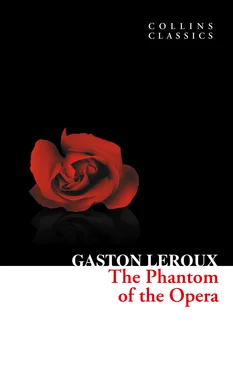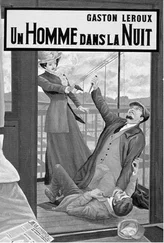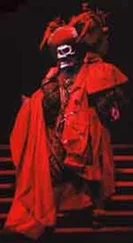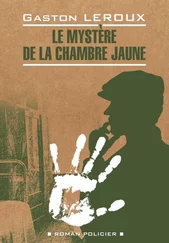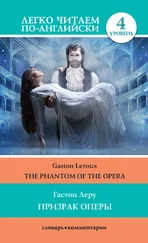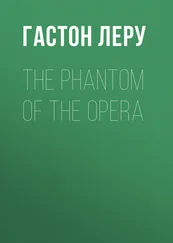SIR:
I can not urge you too strongly to publish the results of your inquiry. I remember perfectly that, a few weeks before the disappearance of that great singer, Christine Daaé, and the tragedy which threw the whole of the Faubourg Saint-Germain into mourning, there was a great deal of talk, in the foyer of the ballet, on the subject of the “ghost;” and I believe that it only ceased to be discussed in consequence of the later affair that excited us all so greatly. But, if it be possible—as, after hearing you, I believe—to explain the tragedy through the ghost, then I beg you, sir, to talk to us about the ghost again. Mysterious though the ghost may at first appear, he will always be more easily explained than the dismal story in which malevolent people have tried to picture two brothers killing each other who had worshiped each other all their lives.
Believe me, etc.
Lastly, with my bundle of papers in hand, I once more went over the ghost’s vast domain, the huge building which he had made his kingdom. All that my eyes saw, all that my mind perceived, corroborated the Persian’s documents precisely; and a wonderful discovery crowned my labours in a very definite fashion. It will be remembered that, later, when digging in the substructure of the Opera, before burying the phonographic records of the artist’s voice, the workmen laid bare a corpse. Well, I was at once able to prove that this corpse was that of the Opera ghost. I made the acting-manager put this proof to the test with his own hand; and it is now a matter of supreme indifference to me if the papers pretend that the body was that of a victim of the Commune.
The wretches who were massacred, under the Commune, in the cellars of the Opera, were not buried on this side; I will tell where their skeletons can be found in a spot not very far from that immense crypt which was stocked during the siege with all sorts of provisions. I came upon this track just when I was looking for the remains of the Opera ghost, which I should never have discovered but for the unheard-of chance described above.
But we will return to the corpse and what ought to be done with it. For the present, I must conclude this very necessary introduction by thanking M. Mifroid (who was the commissary of police called in for the first investigations after the disappearance of Christine Daaé), M. Rémy, the late secretary, M. Mercier, the late acting-manager, M. Gabriel, the late chorus-master, and more particularly Mme. la Baronne de Castelot-Barbezac, who was once the “little Meg” of the story (and who is not ashamed of it), the most charming star of our admirable corps de ballet, the eldest daughter of the worthy Mme. Giry, now deceased, who had charge of the ghost’s private box. All these were of the greatest assistance to me; and, thanks to them, I shall be able to reproduce those hours of sheer love and terror, in their smallest details, before the reader’s eyes.
And I should be ungrateful indeed if I omitted, while standing on the threshold of this dreadful and veracious story, to thank the present management of the Opera, which has so kindly assisted me in all my inquiries, and M. Messager in particular, together with M. Gabion, the acting-manager, and that most amiable of men, the architect intrusted with the preservation of the building, who did not hesitate to lend me the works of Charles Garnier, although he was almost sure that I would never return them to him. Lastly, I must pay a public tribute to the generosity of my friend and former collaborator, M. J. Le Croze, who allowed me to dip into his splendid theatrical library and to borrow the rarest editions of books by which he set great store.
Gaston Leroux
CHAPTER 1 Is It the Ghost?
It was the evening on which MM. Debienne and Poligny, the managers of the Opera, were giving a last gala performance to mark their retirement. Suddenly the dressing-room of La Sorelli, one of the principal dancers, was invaded by half-a-dozen young ladies of the ballet, who had come up from the stage after “dancing” Polyeucte . They rushed in amid great confusion, some giving vent to forced and unnatural laughter, others to cries of terror. Sorelli, who wished to be alone for a moment to “run through” the speech which she was to make to the resigning managers, looked around angrily at the mad and tumultuous crowd. It was little Jammes—the girl with the tip-tilted nose, the forget-me-not eyes, the rose-red cheeks and the lily-white neck and shoulders—who gave the explanation in a trembling voice:
“It’s the ghost!” And she locked the door.
Sorelli’s dressing-room was fitted up with official, commonplace elegance. A pier-glass, a sofa, a dressing-table and a cupboard or two provided the necessary furniture. On the walls hung a few engravings, relics of the mother, who had known the glories of the old Opera in the Rue le Peletier; portraits of Vestris, Gardel, Dupont, Bigottini. But the room seemed a palace to the brats of the corps de ballet, who were lodged in common dressing-rooms where they spent their time singing, quarrelling, smacking the dressers and hairdressers and buying one another glasses of cassis, beer, or even rhum, until the callboy’s bell rang.
Sorelli was very suspicious. She shuddered when she heard little Jammes speak of the ghost, called her a “silly little fool” and then, as she was the first to believe in ghosts in general, and the Opera ghost in particular, at once asked for details:
“Have you seen him?”
“As plainly as I see you now!” said little Jammes, whose legs were giving way beneath her, and she dropped with a moan into a chair.
Thereupon little Giry—the girl with eyes black as sloes, hair black as ink, a swarthy complexion and a poor little skin stretched over poor little bones—little Giry added:
“If that’s the ghost, he’s very ugly!”
“Oh, yes!” cried the chorus of ballet-girls.
And they all began to talk together. The ghost had appeared to them in the shape of a gentleman in dress-clothes, who had suddenly stood before them in the passage, without their knowing where he came from. He seemed to have come straight through the wall.
“Pooh!” said one of them, who had more or less kept her head. “You see the ghost everywhere!”
And it was true. For several months, there had been nothing discussed at the Opera but this ghost in dress-clothes who stalked about the building, from top to bottom, like a shadow, who spoke to nobody, to whom nobody dared speak and who vanished as soon as he was seen, no one knowing how or where. As became a real ghost, he made no noise in walking. People began by laughing and making fun of this spectre dressed like a man of fashion or an undertaker; but the ghost legend soon swelled to enormous proportions among the corps de ballet . All the girls pretended to have met this supernatural being more or less often. And those who laughed the loudest were not the most at ease. When he did not show himself, he betrayed his presence or his passing by accident, comic or serious, for which the general superstition held him responsible. Had any one met with a fall, or suffered a practical joke at the hands of one of the other girls, or lost a powder-puff, it was at once the fault of the ghost, of the Opera ghost.
After all, who had seen him? You meet so many men in dress-clothes at the Opera who are not ghosts. But this dress-suit had a peculiarity of its own. It covered a skeleton. At least, so the ballet-girls said. And, of course, it had a death’s head.
Was all this serious? The truth is that the idea of the skeleton came from the description of the ghost given by Joseph Buquet, the chief scene-shifter, who had really seen the ghost. He had run up against the ghost on the little staircase, by the footlights, which leads to “the cellars.” He had seen him for a second—for the ghost had fled—and to any one who cared to listen to him he said:
Читать дальше
